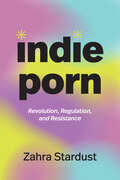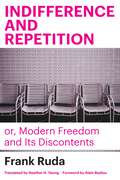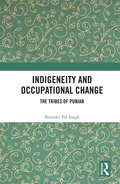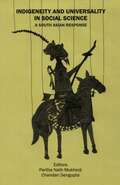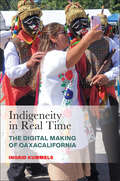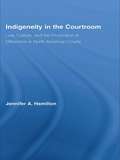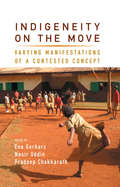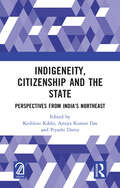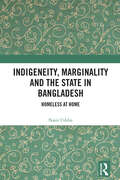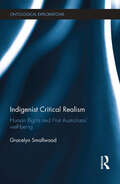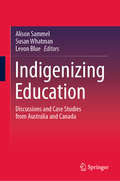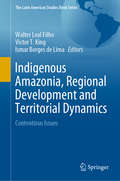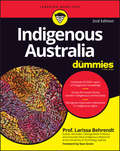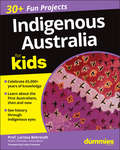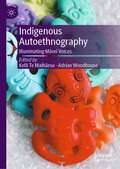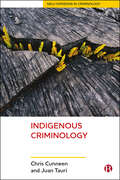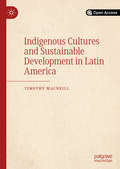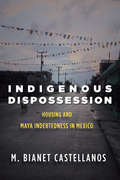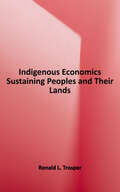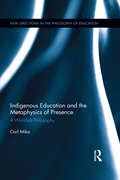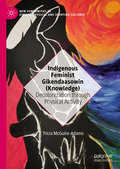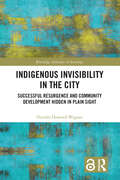- Table View
- List View
Indie Porn: Revolution, Regulation, and Resistance (a Camera Obscura book)
by Zahra StardustIn Indie Porn, Zahra Stardust examines the motivations and interventions of independent porn producers as they navigate criminal laws, risk-averse platforms, discriminatory algorithms, and rampant piracy. Herself a porn performer and participant, Stardust takes readers behind the scenes, offering intimate insights into this sociopolitical movement. She finds politicians who watch porn in parliament, protesters leading face-sitting demonstrations, sex workers making COVID-safe pornography, and artists reverse-engineering porn detection software. Against the backdrop of a global gig economy, Stardust documents the promises of indie porn to democratize content, revolutionize production, and redistribute wealth while outlining the fantasies of regulators, whose illusions of what porn is and does foreclose possibilities for transformation. Inevitably, as these paradigms collide, porn producers engage in creative tactics to hustle for survival and visibility, from ethical certification to law reform, sometimes reproducing hierarchies of stigma themselves. By highlighting how porn stigma is bound up with intersecting oppressions, Stardust identifies these junctions as coalitional opportunities for changing social relationships to sex, work, and capitalism.
Indifference and Repetition; or, Modern Freedom and Its Discontents
by Frank RudaIn capitalism human beings act as if they are mere animals. So we hear repeatedly in the history of modern philosophy. Indifference and Repetition examines how modern philosophy, largely coextensive with a particular boost in capitalism’s development, registers the reductive and regressive tendencies produced by capitalism’s effect on individuals and society.Ruda examines a problem that has invisibly been shaping the history of modern, especially rationalist philosophical thought, a problem of misunderstanding freedom. Thinkers like Descartes, Kant, Hegel, and Marx claim that there are conceptions and interpretations of freedom that lead the subjects of these interpretations to no longer act and think freely. They are often unwillingly led into unfreedom. It is thus possible that even “freedom” enslaves. Modern philosophical rationalism, whose conceptual genealogy the books traces and unfolds, assigns a name to this peculiar form of domination by means of freedom: indifference. Indifference is a name for the assumption that freedom is something that human beings have: a given, a natural possession. When we think freedom is natural or a possession we lose freedom. Modern philosophy, Ruda shows, takes its shape through repeated attacks on freedom as indifference; it is the owl that begins its flight, so that the days of unfreedom will turn to dusk.
Indigeneity and Occupational Change: The Tribes of Punjab
by Birinder Pal SinghThis book is about the presence of the absent— the tribes of Punjab, India, many of them still nomadic, constituting the poorest of the poor in the state. Drawing on exhaustive fieldwork and ethnographic accounts of more than 750 respondents, it explores the occupational change across generations to prove their presence in the state before the Criminal Tribes Act was implemented in 1871. The archival reports reveal the atrocities unleashed by the colonial government on these people. The volume shows how the post-colonial government too has proved no different; it has done little to bring them into the mainstream society by not exploiting their traditional expertise or equipping them with modern skills. This book will be of great interest to scholars of sociology, social anthropology, social history, public policy, development studies, tribal communities and South Asian studies.
Indigeneity and Universality in Social Science: A South Asian Response
by Partha Nath Mukherji and Chandan SenguptaEmerging out of the Renaissance and the industrial revolution, the set of disciplines that got institutionalised as the social sciences were fashioned in Europe. However, what were areas of scholarly inquiry responding to specifically Western problems and concerns, laid claim to universality in course of time and were uncritically accepted as being so until they began to be challenged by non-Western thinkers in the second half of the twentieth century. Bringing together 18 essays by distinguished social scientists, this volume is a major contribution to the debate on the indigenisation of the social sciences. It addresses two central questions from a primarily Asian perspective: - Are the social sciences that originated in the West, and are essentially indigenous to it, universal for the rest? - Can the universal explain the particular, unless the universals in the particulars of different cultural contexts contribute to the construction of the universal? Some of the issues explored in this twin framework are: - The de-parochialisation of Western social science. - The concept of the ‘captive mind’, which fails to fathom its captivity. - The limitations of Western social sciences on crucial issues such as modernisation, economic liberalisation and structural adjustment. - The validity and potential of indigenous models of development as demonstrated by Bhutan’s concept of Gross National Happiness. - Oral traditions and their potential for universal knowledge.
Indigeneity in Real Time: The Digital Making of Oaxacalifornia (Latinidad: Transnational Cultures in the United States)
by Ingrid KummelsLong before the COVID-19 crisis, Mexican Indigenous peoples were faced with organizing their lives from afar, between villages in the Oaxacan Sierra Norte and the urban districts of Los Angeles, as a result of unauthorized migration and the restrictive border between Mexico and the United States. By launching cutting-edge Internet radio stations and multimedia platforms and engaging as community influencers, Zapotec and Ayuujk peoples paved their own paths to a transnational lifeway during the Trump era. This meant adapting digital technology to their needs, setting up their own infrastructure, and designing new digital formats for re-organizing community life in all its facets—including illness, death and mourning, collective celebrations, sport tournaments, and political meetings—across vast distances. Author Ingrid Kummels shows how mediamakers and users in the Sierra Norte villages and in Los Angeles created a transborder media space and aligned time regimes. By networking from multiple places, they put into practice a communal way of life called Comunalidad and an indigenized American Dream—in real time.
Indigeneity in the Courtroom: Law, Culture, and the Production of Difference in North American Courts (Indigenous Peoples and Politics)
by Jennifer A. HamiltonThe central question of this book is when and how does indigeneity in its various iterations – cultural, social, political, economic, even genetic – matter in a legal sense? Indigeneity in the Courtroom focuses on the legal deployment of indigenous difference in US and Canadian courts in the late 20th and early 21st centuries. Through ethnographic and historical research, Hamilton traces dimensions of indigeneity through close readings of four legal cases, each of which raises important questions about law, culture, and the production of difference. She looks at the realm of law, seeking to understand how indigeneity is legally produced and to apprehend its broader political and economic implications.
Indigeneity on the Move: Varying Manifestations of a Contested Concept
by Eva Gerharz Nasir Uddin Pradeep Chakkarath“Indigeneity” has become a prominent yet contested concept in national and international politics, as well as within the social sciences. This edited volume draws from authors representing different disciplines and perspectives, exploring the dependence of indigeneity on varying sociopolitical contexts, actors, and discourses with the ultimate goal of investigating the concept’s scientific and political potential.
Indigeneity, Citizenship and the State: Perspectives from India’s Northeast
Whatever be the definition of 'indigenous' vis-a-vis 'indigeneity', and however concensual it might be, both these terms have been inferred, applied and questioned in multifarious ways. The concept indigeneity in Asia has transformed considerably, over a period of time. With the rise in the indigeneity movement and large-scale migration, citizenship within national borders is challenged, and the borders in question are also contested. This book chronicles the discernible strains on the questions of indegeneity, citizenship, identity, and border making in the Northeast India. The issues pertaining to indigeneity, citizenship, and state, are also a reminder of the residues of colonial doings that have had a colossal impact till this day. Through empirical evidence backed by theoretical underpinnings, each essay in the book demonstrates the diversity of approaches that can be used to interrogate the debate on indegeneity, citizenship, the state, and opens the conversation on Northeast India. This book is co-published with Aakar Books. Print edition not for sale in South Asia (India, Sri Lanka, Nepal, Bangladesh, Pakistan and Bhutan)
Indigeneity, Marginality and the State in Bangladesh: Homeless at Home
by Nasir UddinThis book explores the critical linkages between indigeneity, marginality, and the state in Bangladesh. Indigeneity is progressively gaining currency in politics and thereby becoming an active force in the larger context of national activism with transnational patronage and international support. Drawing on comprehensive and solid ethnographic accounts, the book offers a broader understanding of the process of marginalisation and the emergence of new leadership among the Khumi, an indigenous group of Bangladesh. It illuminates how the Khumi have realised their position on the margin of the state within the socio-economic, political, and ethnic history of the Chittagong Hill Tracts. It also looks at how kin-based social organisations and non-kin-based social relations become bases of power and authority as well as cooperation and reciprocity in Khumi society.Lucid and topical, the book will be of interest to scholars and researchers of indigenous studies, anthropology, ethnic studies, sociology, political sciences, international relations, border studies, and South Asian studies, especially those concerned with Bangladesh.
Indigenist Critical Realism: Human Rights and First Australians’ Wellbeing
by Gracelyn SmallwoodIndigenist Critical Realism: Human Rights and First Australians’ Wellbeing consists of a defence of what is popularly known as the Human Rights Agenda in Indigenous Affairs in Australia. It begins with a consideration of the non-well-being of Indigenous Australians, then unfolding a personal narrative of the author Dr Gracelyn Smallwood's family. This narrative is designed not only to position the author in the book but also in its typicality to represent what has happened to so many Indigenous families in Australia. The book then moves to a critical engagement with dominant intellectual positions such as those advanced by commentators such as Noel Pearson, Peter Sutton, Gary Johns and Keith Windschuttle. The author argues that intellectuals such as these have to a great extent colonised what passes for common sense in mainstream Australia. This common sense straddles the domains of history, health and education and Dr Smallwood has chosen to follow her adversaries into all of these areas. This critique is anchored by a number of key philosophical concepts developed by the Critical Realist philosopher Roy Bhaskar. The book advances and analyses a number of case studies - some well-known, even notorious such as the Hindmarsh Island Affair (South Australia) and the Northern Territory Intervention; others like that of the author's late nephew Lyji Vaggs (Qld) and Aboriginal Elder May Dunne (Qld) much less so. Representing one of the first attempts to engage at a critical and intellectual level in this debate by an Indigenous activist, this book is essential reading for students and scholars interested in Critical Realism and colonialism.
Indigenizing Education: Discussions and Case Studies from Australia and Canada
by Alison Sammel Susan Whatman Levon BlueThis book provides invaluable guidance for community, school and university-based educators who are evaluating their educational philosophies and practices to support Indigenizing education. The examples from Australia and Canada shared in this book illustrate how Indigenous and non-Indigenous educators have worked together to Indigenize their educational practices, showcasing community empowerment and reconciliation agendas. It also enables beginning educators to gain a meaningful and critical understanding of what Indigenizing education can mean in their own future practice.
Indigenous African Knowledge Production
by Njoki Nathani-WaneThe Jie people of northern Uganda and the Turkana of northern Kenya have a genesis myth about Nayeche, a Jie woman who followed the footprints of a gray bull across the waterless plateau and who founded a "cradle land" in the plains of Turkana. In Remembering Nayeche and the Gray Bull Engiro, Mustafa Kemal Mirzeler shows how the poetic journey of Nayeche and the gray bull Engiro and their metaphorical return during the Jie harvest rituals gives rise to stories, imagery, and the articulation of ethnic and individual identities.Since the 1990s, Mirzeler has travelled to East Africa to apprentice with storytellers. Remembering Nayeche and the Gray Bull Engiro is both an account of his experience listening to these storytellers and of how oral tradition continues to evolve in the modern world. Mirzeler's work contributes significantly to the anthropology of storytelling, the study of myth and memory, and the use of oral tradition in historical studies.
Indigenous Amazonia, Regional Development and Territorial Dynamics: Contentious Issues (The Latin American Studies Book Series)
by Victor T. King Walter Leal Filho Ismar Borges de LimaThis book brings together a valuable collection of case studies and conceptual approaches that outline the present state of Amazonia in the 21st century. The many problems are described and the benefits, as well as the achievements of regional development are also discussed. The book focuses on three themes for discussion and recommendations: indigenous peoples, their home (the forest), and the way(s) to protect and sustain their natural home (biodiversity conservation). Using these three themes this volume offers a comprehensive critical review of the facts that have been the reality of Amazonia and fills a gap in the literature.The book will appeal to scholars, professors and practitioners. An outstanding group of experienced researchers and individuals with detailed knowledge of the proposed themes have produced chapters on an array of inter-related issues to demonstrate the current situation and future prospects of Amazonia. Issues investigated and debated include: territorial management; indigenous territoriality and land demarcation; ethnodevelopment; indigenous higher education and capacity building; natural resource appropriation; food security and traditional knowledge; megadevelopmental projects; indigenous acculturation; modernization of Amazonia and its regional integration; anthropogenic interventions; protected areas and conservation; political ecology; postcolonial issues, and the sustainability of Amazonia.
Indigenous Australia For Dummies (For Dummies Ser.)
by Larissa BehrendtA comprehensive, relevant, and accessible look at all aspects of Indigenous Australian history and culture What is The Dreaming? How many different Indigenous tribes and languages once existed in Australia? What is the purpose of a corroboree? What effect do the events of the past have on Indigenous peoples today? Indigenous Australia For Dummies, Second Edition answers these questions and countless others about the oldest race on Earth. It explores Indigenous life in Australia before 1770, the impact of white settlement, the ongoing struggle by Aboriginal and Torres Strait Islander peoples to secure their human rights and equal treatment under the law, and much more. Celebrating the contributions of Indigenous people to contemporary Australian culture, the book explores Indigenous art, music, dance, literature, film, sport, and spirituality. It discusses the concept of modern Indigenous identity and examines the ongoing challenges facing Indigenous communities today, from health and housing to employment and education, land rights, and self-determination. Explores significant political moments—such as Paul Keating's Redfern Speech and Kevin Rudd's apology, and more Profiles celebrated people and organisations in a variety of fields, from Cathy Freeman to Albert Namatjira to the Bangarra Dance Theatre and the National Aboriginal Radio Service Challenges common stereotypes about Indigenous people and discusses current debates, such as a land rights and inequalities in health and education Now in its second edition, this book will enlighten readers of all backgrounds about the history, struggles and triumphs of the diverse, proud, and fascinating peoples that make up Australia's Indigenous communities. With a foreword by Stan Grant, Indigenous Australia For Dummies, Second Edition is a must-read account of Australia’s first people.
Indigenous Australia For Kids For Dummies
by Larissa BehrendtA comprehensive, relevant, and accessible look at all aspects of Indigenous Australian history and culture. Indigenous Australia For Kids For Dummies is here to enlighten you about the history, struggles and triumphs of the diverse peoples that make up Australia’s Indigenous communities. Did you know that Australia is home to the world’s oldest culture? Experience 60,000 years of history and culture, plus, get right up-to-the-minute, with amazing facts about Indigenous sports and entertainment figures and info on what matters to Indigenous peoples today. This interactive book has loads of features that will engage and excite readers aged 10-15 years old – and their teachers and parents! Featuring profiles of celebrated Indigenous people like Cathy Freeman and Albert Namatjira, as well as fun research projects and hands-on activities that bring Indigenous Australia to life. Ever wanted to connect with your local Indigenous communities? This book will give you ideas about how you can connect with First Nations peoples and other interactive ways to extend your learning out of the book. Discover the rich culture, long history and special values of the world’s oldest race Learn about Indigenous art, song, dance, literature and contributions to contemporary Australia Impress friends and family with your knowledge of Australian colonisation and Indigenous rights Figure out what’s going on in the lives of Indigenous Australians today – and bust the most common myths This book is perfect for young readers who want to appreciate and understand the diverse, proud, and fascinating peoples that make up Australia's Indigenous communities.
Indigenous Autoethnography: Illuminating Māori Voices
by Kelli Te Maihāroa Adrian WoodhouseThis book opens new pathways for decolonial autoethnography, presented as a series of reflective stories that showcase how Māori have negotiated and navigated their personal and professional identities within contemporary society. Framed within the academic methodology of Indigenous Autoethnography, authors recount their personal and professional experiences to address their encounters with cultural trauma and personal enlightenment. As a culturally responsive methodology, Indigenous Autoethnography embraces reflective practice and critical awakening to validate Indigenous knowledge, ensuring that it remains meaningful and responsive to the needs of Māori. Utilising metaphorical storytelling as a primary means of sensemaking, this work reinforces the importance of Māori and other Indigenous People to seek wisdom from the past to guide them into the future. With Indigenous knowledge historically ignored and misrepresented in higher education, this seminal text provides invaluable guidance for global Indigenous researchers seeking to produce story work that genuinely encompasses physical, emotional, and spiritual dimensions.
Indigenous Criminology (New Horizons in Criminology)
by Chris Cunneen Juan TauriIndigenous Criminology is the first book to comprehensively explore Indigenous people’s contact with criminal justice systems in a contemporary and historical context. Drawing on comparative Indigenous material from North America, Australia and Aotearoa New Zealand, it addresses both the theoretical underpinnings to the development of a specific Indigenous criminology, and canvasses the broader policy and practice implications for criminal justice. Written by leading criminologists specialising in Indigenous justice issues, the book argues for the importance of Indigenous knowledges and methodologies to criminology, and suggests that colonialism needs to be a fundamental concept to criminology in order to understand contemporary problems such as deaths in custody, high imprisonment rates, police brutality and the high levels of violence in some Indigenous communities. Prioritising the voices of Indigenous peoples, the work will make a significant contribution to the development of a decolonising criminology and will be of wide interest.
Indigenous Cultures and Sustainable Development in Latin America
by Timothy MacNeillThis open access book outlines development theory and practice overtime as well as critically interrogates the “cultural turn” in development policy in Latin American indigenous communities, specifically, in Guatemala, Honduras, Ecuador, and Bolivia. It becomes apparent that culturally sustainable development is both a new and old idea, which is simultaneously traditional and modern, and that it is a necessary iteration in thinking on development. This new strain of thought could inform not only the work of development practitioners, graduate students, and theorists working in the Global South, but in the Global North as well.
Indigenous Dispossession: Housing and Maya Indebtedness in Mexico
by M. Bianet CastellanosFollowing the recent global housing boom, tract housing development became a billion-dollar industry in Mexico. At the national level, neoliberal housing policy has overtaken debates around land reform. For Indigenous peoples, access to affordable housing remains crucial to alleviating poverty. But as palapas, traditional thatch and wood houses, are replaced by tract houses in the Yucatán Peninsula, Indigenous peoples' relationship to land, urbanism, and finance is similarly transformed, revealing a legacy of debt and dispossession. Indigenous Dispossession examines how Maya families grapple with the ramifications of neoliberal housing policies. M. Bianet Castellanos relates Maya migrants' experiences with housing and mortgage finance in Cancún, one of Mexico's fastest-growing cities. Their struggle to own homes reveals colonial and settler colonial structures that underpin the city's economy, built environment, and racial order. But even as Maya people contend with predatory lending practices and foreclosure, they cultivate strategies of resistance—from "waiting out" the state, to demanding Indigenous rights in urban centers. As Castellanos argues, it is through these maneuvers that Maya migrants forge a new vision of Indigenous urbanism.
Indigenous Economics: Sustaining Peoples and Their Lands
by Ronald L. TrosperWhat does "development" mean for Indigenous peoples? Indigenous Economics lays out an alternative path showing that conscious attention to relationships among humans and the natural world creates flourishing social-ecological economies. Economist Ronald L. Trosper draws on examples from North and South America, Aotearoa/New Zealand, and Australia to argue that Indigenous worldviews centering care and good relationships provide critical and sustainable economic models under increasing pressure from biodiversity loss and climate change. He explains the structure of relational Indigenous economic theory, providing principles based on his own and others' work with tribal nations and Indigenous communities. <p><p>Trosper explains how sustainability is created at every level when relational Indigenous economic theory is applied--micro, meso, and macro. Good relationships support personal and community autonomy, replacing the individualism/collectivism dichotomy with relational leadership and entrepreneurship. Basing economies on relationships requires changing governance from the top-down approaches of nation-states and international corporations; instead, each community creates its own territorial relationships, creating plurinational relational states. <p><p>This book offers an important alternative to classic economic theory. In Indigenous Economics, support for Indigenous communities' development and Indigenous peoples' well-being go hand-in-hand. Publication of this book is made possible in part by the Alfred P. Sloan Foundation Program in Public Understanding of Science.
Indigenous Education and the Metaphysics of Presence: A Worlded Philosophy (New Directions in the Philosophy of Education)
by Carl MikaIndigenous Education and the Metaphysics of Presence: A worlded philosophy explores a notion of education called ‘worldedness’ that sits at the core of indigenous philosophy. This is the idea that any one thing is constituted by all others and is, therefore, educational to the extent that it is formational. A suggested opposite of this indigenous philosophy is the metaphysics of presence, which describes the tendency in dominant Western philosophy to privilege presence over absence. This book compares these competing philosophies and argues that, even though the metaphysics of presence and the formational notion of education are at odds with each other, they also constitute each other from an indigenous worlded philosophical viewpoint. Drawing on both Maori and Western philosophies, this book demonstrates how the metaphysics of presence is both related and opposed to the indigenous notion of worldedness. Mika explains that presence seeks to fragment things in the world, underpins how indigenous peoples can represent things, and prevents indigenous students, critics, and scholars from reflecting on philosophical colonisation. However, the metaphysics of presence, from an indigenous perspective, is constituted by all other things in the world, and Mika argues that the indigenous student and critic can re-emphasise worldedness and destabilise presence through creative responses, humour, and speculative thinking. This book concludes by positioning well-being within education, because education comprises acts of worldedness and presence. This book will be of key interest to indigenous as well as non-indigenous academics, researchers and postgraduate students in the fields of philosophy of education, indigenous and Western philosophy, political strategy and post-colonial studies. It will also be relevant for those who are interested in philosophies of language, ontology, metaphysics and knowledge.
Indigenous Feminist Gikendaasowin: Decolonization through Physical Activity (New Femininities in Digital, Physical and Sporting Cultures)
by Tricia McGuire-AdamsThis book presents knowledge from Indigenous women who enact decolonization and wellbeing through physical activity. In sport, physical activity, and health disciplines, there is a significant need for Indigenous women’s theoretical and methodological perspectives. While much research is published from a Western perspective on Indigenous peoples’ health, sport, and physical activity, less is known from Indigenous feminist and community perspectives. The chapters therefore inform the broader sociology of sport and Indigenous feminist fields on Indigenous cultural perspectives of physical activity.
Indigenous Invisibility in the City: Successful Resurgence and Community Development Hidden in Plain Sight (Routledge Advances in Sociology)
by Deirdre Howard-WagnerIndigenous Invisibility in the City contextualises the significant social change in Indigenous life circumstances and resurgence that came out of social movements in cities. It is about Indigenous resurgence and community development by First Nations people for First Nations people in cities. Seventy-five years ago, First Nations peoples began a significant post-war period of relocation to cities in the United States, Canada, Australia, and Aotearoa New Zealand. First Nations peoples engaged in projects of resurgence and community development in the cities of the four settler states. First Nations peoples, who were motivated by aspirations for autonomy and empowerment, went on to create the foundations of Indigenous social infrastructure. This book explains the ways First Nations people in cities created and took control of their own futures. A fact largely wilfully ignored in policy contexts. Today, differences exist over the way governments and First Nations peoples see the role and responsibilities of Indigenous institutions in cities. What remains hidden in plain sight is their societal function as a social and political apparatus through which much of the social processes of Indigenous resurgence and community development in cities occurred. The struggle for self-determination in settler cities plays out through First Nations people’s efforts to sustain their own institutions and resurgence, but also rights and recognition in cities. This book will be of interest to Indigenous studies scholars, urban sociologists, urban political scientists, urban studies scholars, and development studies scholars interested in urban issues and community building and development.
Indigenous Invisibility in the City: Successful Resurgence and Community Development Hidden in Plain Sight (Routledge Advances in Sociology)
by Deirdre Howard-WagnerIndigenous Invisibility in the City contextualises the significant social change in Indigenous life circumstances and resurgence that came out of social movements in cities. It is about Indigenous resurgence and community development by First Nations people for First Nations people in cities.Seventy-five years ago, First Nations peoples began a significant post-war period of relocation to cities in the United States, Canada, Australia, and Aotearoa New Zealand. First Nations peoples engaged in projects of resurgence and community development in the cities of the four settler states. First Nations peoples, who were motivated by aspirations for autonomy and empowerment, went on to create the foundations of Indigenous social infrastructure. This book explains the ways First Nations people in cities created and took control of their own futures. A fact largely wilfully ignored in policy contexts. Today, differences exist over the way governments and First Nations peoples see the role and responsibilities of Indigenous institutions in cities. What remains hidden in plain sight is their societal function as a social and political apparatus through which much of the social processes of Indigenous resurgence and community development in cities occurred. The struggle for self-determination in settler cities plays out through First Nations people’s efforts to sustain their own institutions and resurgence, but also rights and recognition in cities. This book will be of interest to Indigenous studies scholars, urban sociologists, urban political scientists, urban studies scholars, and development studies scholars interested in urban issues and community building and development.This book is available for free in PDF format as Open Access from the individual product page at www.routledge.com. It has been made available under a Creative Commons Attribution-Non Commercial-No Derivatives 4.0 license.
Indigenous Knowledge Production: Navigating Humanity within a Western World (Routledge Advances in Sociology)
by Marcus Woolombi WatersDespite many scholars noting the interdisciplinary approach of Aboriginal knowledge production as a methodology within a broad range of subjects – including quantum mathematics, biodiversity, sociology and the humanities - the academic study of Indigenous knowledge and people is struggling to become interdisciplinary in its approach and move beyond its current label of ‘Indigenous Studies’. Indigenous Knowledge Production specifically demonstrates the use of autobiographical ethnicity as a methodological approach, where the writer draws on lived experience and ethnic background towards creative and academic writing. Indeed, in this insightful volume, Marcus Woolombi Waters investigates the historical connection and continuity that have led to the present state of hostility witnessed in race relations around the world; seeking to further one’s understanding of the motives and methods that have led to a rise in white supremacy associated with ultra-conservatism. Above all, Indigenous Knowledge Production aims to deconstruct the cultural lens applied within the West which denies the true reflection of Aboriginal and Black consciousness, and leads to the open hostility witnessed across the world. This monograph will appeal to undergraduate and postgraduate students, as well as postdoctoral researchers, interested in fields such as Sociology of Knowledge, Anthropology, Cultural Studies, Ethnography and Methodology.
